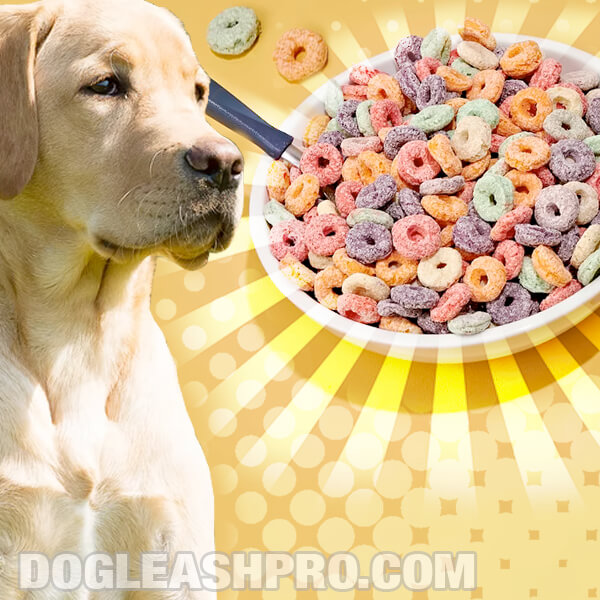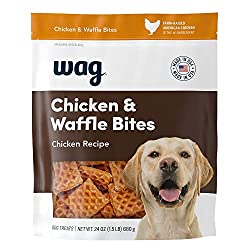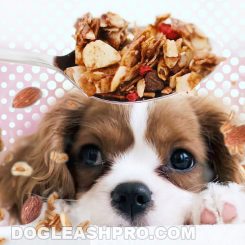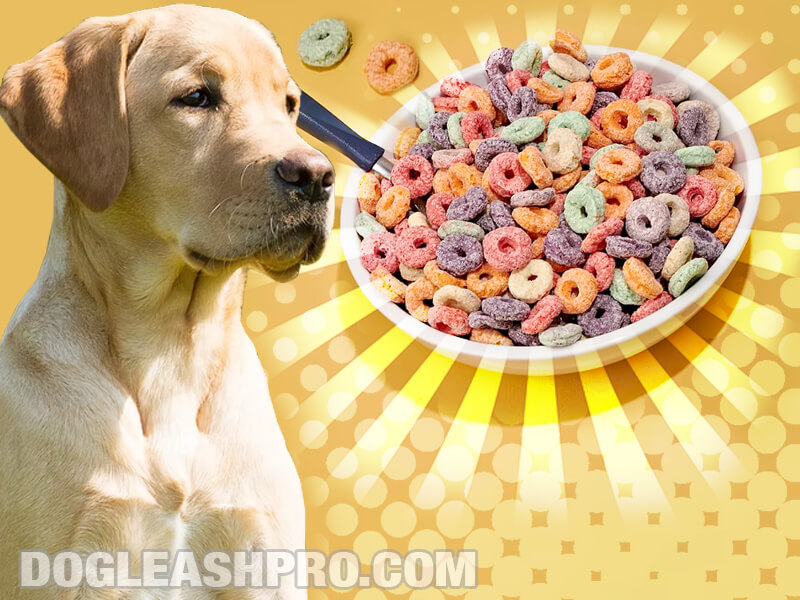
Cereal is one of the most popular breakfast foods in the U.S. While we’re eating our favorite Cereal, our dogs are probably next to us begging for some. Do we fall for their puppy eyes and offer them some of our crunchy Cereal?
If you’re wondering, “can my dog eat Cereal?” this article is for you. We’ll discuss Cereals and dogs in-depth, but for now, here is the short answer.
Can dogs eat Cereal? It depends. Dogs should not eat Cereals that contain ingredients that are toxic to dogs such as raisins, chocolate, or even nuts. Certain cereals are safe for doggy consumption but safe doesn’t mean healthy. If you do feed your dogs Cereal, moderation is key.
In this article, we’ll discuss which Cereals are safe for dogs and which ones to avoid. Let’s get right to it!
Table of Contents
Can dogs have Cereal?

While some Cereals are safe for doggy consumption, most of them are not healthy for dogs. This is why we highly recommend that dogs avoid eating Cereals altogether and eat snacks or treats that are canine-friendly instead.
In general, Cereals do not contain much nutrition for our canine friends. There are some Cereals that may be safe for dogs such as oatmeal Cereals. That’s because oatmeal Cereals are made mostly with water. In fact, many vets may recommend oatmeal Cereals to dogs with constipation and other digestive problems.
If you’re ever concerned or are not sure whether the Cereal is safe for your furry friends, it’s always a good idea to ask your veterinarian.
Luckily, we’ll go over some of the most popular Cereals on the market today and discuss whether your furry pooch can have them.
Before we do so, let’s discuss how Cereal can be bad for dogs.
Is Cereal bad for dogs?
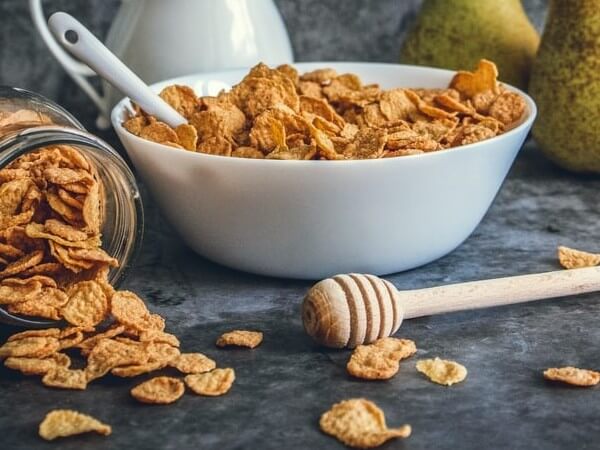
Yes, Cereal can be bad for dogs. There are many reasons why Cereal is bad for dogs.
Cereal has a high grain content which is unhealthy for dogs
Cereals are highly processed and it has a high grain content. Our furry friends don’t require a diet that is high in grain. Instead, they require a balance of protein, fiber, minerals, and essential vitamins. These can come from meat, vegetables, grains, and fruits.
Cereals are not nutritious for our K9 friends because they have a high grain content. Additionally, keep in mind that many varieties of Cereals are highly processed with added additives in them.
Cereals contain additives that are harmful to dogs
The additives make the Cereals less healthy or nutritious to our furry companions.
Cereals are packed full of sugar which can cause weight gain in dogs
Cereals are very popular because they taste great, with or without milk. They taste great because they are packed full of sugar. Before you offer your dog any type of Cereal, be sure to take a look at both the ingredients and the nutritional profile first.
If a lot of sugar was used, say over 10 grams of sugar per serving, then it’s best to skip the Cereal and feed your pooch canine-friendly treats instead.
Too much sugar consumption can lead to health issues such as weight gain, canine obesity, dental issues such as cavities and tooth decay, diabetes, and even pancreatitis.
Remember that the bacteria in your dog’s mouth use the sugar to produce acid. The acid then destroys the mineral in your dog’s enamel. When the enamel gets destroyed, it can cause tooth decay and this can lead to dental disease in dogs.
You might also like: Can Dogs Eat Granola?
Avoid feeding your dog Cereals that contain chocolate, nuts, or raisins
Chocolate is extremely dangerous and poisonous to dogs because it contains a chemical called theobromine. Unfortunately, dogs are not able to process and metabolize this chemical. In addition, chocolate contains caffeine, which dogs also can’t metabolize.
The combination of theobromine and caffeine is what makes chocolate very harmful to dogs. Both chemicals are actually used for medicinal purposes as blood vessel dilator, heart stimulant, diuretic, and smooth muscle relaxant.
Unlike our bodies, our dog’s bodies are very sensitive to the effects of both caffeine and theobromine.
Dogs may experience chocolate poisoning when they consume a lot of chocolate-coated Cereal or Cereal with chocolate as one of its ingredients.
Signs and symptoms of chocolate poisoning in dogs include:
- Extreme thirst.
- Frequent urination.
- Diarrhea.
- Vomiting.
- Restlessness.
- Panting.
- Increased heart rate.
- Seizures (in severe cases).
- Muscle tremors (in severe cases).
- Heart failure (in severe cases).
If you suspect your pooch has chocolate poisoning, contact your vet as soon as possible as this requires immediate medical attention.
Similarly, raisins and grapes are also harmful to dogs because they can cause kidney failure or disease in dogs. Many believe it could be due to the following chemicals in grapes:
- Salicylate. Grapes naturally contain this aspirin-like drug and it can decrease the blood flow to the dog’s kidney.
- Mycotoxin. Grapes also contain this chemical which is a dangerous substance produced by mold or fungus.
- Tartaric acid.
There are some Cereals that may have raisins in them such as Kellogg’s Raisin Bran, Total Raisin Bran, and Post Raisin Bran. Keep these Cereals away from your furry family members.
If you suspect your canine pooch has raisin or grape toxicity, contact your vet right away as this type of poisoning also requires immediate medical attention. Alternatively, you can also contact the 24/7 Pet Poison helpline if your vet is not available to help.
When it comes to nuts, avoid any Cereals that contain the following types of nuts:
- Macadamia nuts are extremely toxic to dogs. Dogs that consume Macadamia nuts may experience weakness, depression, vomiting, and difficulty walking.
- Walnuts. Although Walnuts are not toxic to dogs, they do have a high-fat content, and dogs that consume food with a high amount of fat can experience upset stomachs and even pancreatitis. Walnuts can also be a choking hazard may even cause intestinal obstruction. Watch out for walnuts that are moldy since they contain a chemical called tremorgenic mycotoxins.
- Hickory nuts can also be a choking hazard and cause intestinal obstruction. Dogs that eat hickory nuts may have an upset stomach. Moldy hickory nuts may also contain tremorgenic mycotoxins as well.
Other nuts that have a high-fat content include:
- Almonds.
- Cashews.
- Pecans.
- Pistachios.
- Peanuts.
- Brazil nuts.
If you suspect your pooch accidentally consumes any of the nuts above, consult your vet as soon as you can. Nut toxicity is serious and dogs may experience seizures, muscle weakness, and even muscle tremors. If it’s not treated, your pooch may have pancreatitis.
Dry chunky or lumpy Cereal may be a choking hazard for dogs
There are some varieties of Cereal that are very lumpy and come in chunks. This makes Cereal potentially dangerous for dogs as it can get lodged in your dog’s throat and cause choking in dogs.
If your pooch does manage to swallow the chunky Cereal, there’s still a chance that the lumpy chunky Cereal may get lodged in your dog’s digestive tract.
For your canine companion’s safety, avoid feeding him or her Cereals that are chunky or lumpy.
Is Cereal good for dogs?
No, Cereal is not good for dogs. Cereals are usually marketed as beneficial or healthy for us since they’ve been fortified with minerals and vitamins during processing, however, are they healthy or good for our dogs?
Not really! Here’s why.
Although vitamins and minerals have been added to the Cereal, your furry friends won’t really benefit from eating it unless they eat a lot of Cereal, and we mean a lot in order to receive those health benefits!
It’s also not a good idea to give your pooch a lot of Cereal, even if the Cereal is marketed as healthy. That’s because when dogs eat a lot of Cereal, they may be at risk of upset stomach or gastrointestinal upset.
Remember to never replace your dog’s regular diet with Cereal. Cereal is not in any way meant to be a substitute or a replacement for your dog’s regular food for the reasons above.
Is Cereal safe for dogs?
As long as the Cereal does not contain ingredients that are toxic to dogs such as nuts, chocolate, or raisins, it is relatively safe for canine consumption.
Most Cereals are safe for dogs because they are low in calories and fat. Be sure to only give your dogs Cereal in moderation because too much can lead to weight gain, diabetes, and other health issues we discussed above.
What Cereal is good for dogs?
My father loves Cereal. In fact, he’ll have Cereal for breakfast, lunch, and dinner if he could. Most days when he’s eating his Cereal, our Chihuahua Lily would beg him for some.
So what Cereals are good for dogs? Let’s discuss this next.
What Cereals can dogs eat?
Here is a list of Cereals that dogs can eat:
- Cheerios, including Honey Nut Cheerios.
- Honey Bunches of Oats.
- Rice Krispies.
- Rice Chex.
- Corn Flakes.
- Oat Bran.
- Bran Flakes.
- Cream of Wheat.
- Cinnamon Toast Crunch.
It’s best to avoid the following types of Cereals:
- Raisin Bran.
- Reese’s Puffs.
- Coco Puffs.
- Lucky Charms.
- Froot Loops.
Can dogs eat Apple Jacks?
No, dogs should not eat Apple Jacks because Apple Jacks Cereal is loaded with tons of sugar, additives, carbs, saturated fat, and salt.
Also, this Cereal is high in calories. Dogs that munch on just 1 cup of Apple Jacks cereal daily or regularly may start to gain weight, have an upset stomach, develop Type II diabetes and dental issues, experience metabolic changes, become lethargic, and have pancreatitis.
Here is the nutritional profile of just 1 cup of Apple Jacks Cereal.
Nutritional Profile of Apple Jacks Cereal (1 Cup)
| Name, Unit | Amount |
| Calories, cal | 110 |
| Sugar, g | 10 |
| Sodium, mg | 150 |
| Total Carbohydrate, g | 25 |
| Total Fat, g | 1 |
| Saturated Fat, g | 0.5 |
| Protein, g | 2 |
| Fiber, g | 3 |
| Potassium, mg | 45 |
| Iron, mg | 5 |
| Vitamin A, mg | 500 |
| Vitamin C, mg | 15 |
In general, dogs should not eat human food that is high in sugar, salt, or calories. Since Apple Jacks Cereal does not provide any nutritional value to our canine friends and is considered an empty-calorie food, it’s best that owners do not feed them this sweet Cereal.
If your dogs have urinary tract infections (UTIs) or kidney infections, it’s best that you keep Apple Jacks Cereal away from them. That’s because consuming a lot of sugar can actually increase the acidity of your dog’s urine and this allows the bacteria in their urine to grow faster and thrive.
So, can dogs eat Apple Jacks Cereal?
Absolutely, not! Dogs should not have Apple Jacks Cereal for the reasons above. Sugary snacks can negatively affect your canine friend’s immune system and functions. When our furry friend’s immune system becomes weaker, they may be prone to diseases and illnesses such as the following:
- Infections.
- Osteoarthritis.
- Cancer.
- Diabetes.
Instead of feeding my two furry friends Apple Jacks Cereal, I give them the following healthy doggy treats instead. My Labrador and Chihuahua both love these treats and are always begging me for more.
Every time I start to open the treat bag, their ears would perk up, they’d run over to where I am and do a circle dance in anticipation of these tasty treats.
Can dogs eat Raisin Bran Cereal?
No, dogs should not eat Raisin Bran Cereal. Raisin Bran Cereal contains raisins which are toxic to dogs. Also, it has a high grain content with tons of sugar.
Can dogs eat Cereal with milk?
No, dogs should not eat Cereal with milk. That’s because most adult dogs are lactose intolerant and are not able to process dairy products like milk properly.
Lactose is the sugar found in milk and most adult dogs lack the lactase enzyme that is responsible for breaking down lactose in milk.
For these reasons, dogs should avoid eating Cereal with milk.
Can dogs eat baby oatmeal Cereal?
Yes, dogs can eat baby oatmeal Cereal in moderation. However, make sure it is prepared properly before feeding it to your pooch. The baby oatmeal Cereal should be cooked with water and it should be plain without any added flavoring or spices.
Can dogs eat Cereal flakes?
Yes, dogs can eat Cereal flakes in moderation. Most Cereal flakes are made of corn so before you feed them to your canine companion, make sure they are allergic to corn.
Moderation is key because Cereal flakes like corn flakes contain high levels of carbohydrates with no protein. This is like feeding your pooch empty-calorie food.
Can dogs eat Lucky Charms Cereal?
No, dogs should not eat Lucky Charms Cereal. Lucky Charms Cereal is packed full of sugar which is not healthy for our furry companions.
Also, Lucky Charm Cereals contain refined grains that dogs don’t need in their daily diet.
Lastly, let’s not forget the preservatives in this Cereal. Both sugar and preservative can cause upset stomach, weight gain, and obesity in dogs. Choose healthy dog treats that are grain-free instead.
Can dogs eat Chex Cereal?
If you’re wondering, “can dogs eat rice Chex Cereal?” the answer is yes. Rice is safe for doggy consumption, but make sure it is not high in sugar and doesn’t contain any other ingredients that are toxic to dogs.
Keep in mind that rice Chex Cereal should not replace your dog’s daily diet.
Can dogs eat fiber one Cereal?
Yes, dogs can eat fiber one Cereal in moderation. Fiber one Cereal like Bran flakes is actually beneficial to your dog’s digestive system because they are high in fiber. Cereal high in fiber can help to lower your dog’s cholesterol and blood pressure while also increasing his or her energy level.
Can dogs eat Reese’s puffs Cereal?
No, dogs should not eat Reese’s puffs Cereal. A quick look at the ingredients let us know that there are Hershey’s Cocoas in them which is not safe for doggy consumption. Additionally, there are added preservatives in Reese’s puffs Cereal to give the Cereal a longer shelf life.
RELATED: Can Dogs Eat Reese’s Pieces? Here’s the Truth!
Can dogs eat Kix Cereal?
Yes, dogs can eat Kix Cereal in moderation. However, since it is high in sugar and carbohydrates, it is considered empty-calorie food for dogs. For this reason, it’s best to give your pooch Kix Cereal as a rare or occasional treat.
Can dogs eat Cocoa Puffs?
No, dogs should not eat Cocoa Puffs since this is a chocolate-flavored Cereal and contains traces of chocolate. Chocolate is extremely toxic to dogs and all dog owners should keep chocolate away from their pets.
Luckily, Cocoa Puffs Cereal doesn’t contain a significant amount of chocolate in them to cause harm if your dogs only ingest a small amount.
If your four-legged friends consume several pieces of Cocoa Puffs, they should be fine. However, there have been cases of dogs getting sick if they ingest way too many pieces of Cocoa Puffs Cereal.
As soon as you notice your pooch has munched on a few Cocoa Puffs, make sure to monitor him or her closely for any adverse reaction or behavioral changes. It could take up to 12 to 24 hours to notice any signs of illness or toxicity.
If your pooch is showing any of the following symptoms, you’ll want to contact your vet right away:
- Seizures.
- Panting.
- Shaking or trembling.
- Abdominal swelling.
- Tachycardia or increased heart rate.
- Vomiting.
- Diarrhea.
In addition, there are tons of sugar in Cocoa Puffs which is not healthy for dogs. Too much sugar consumption can cause a host of health issues in dogs, including weight gain, diabetes, tooth decay or tooth loss, metabolic changes, and even pancreatitis.
So, can dogs eat Cereal?
We hope this article was helpful and provided you with the answer you need. If you’re ever unsure of whether your furry pals can eat certain types of Cereal, it’s best to take a look at the ingredients first as well as the nutritional profile.
This will help you to determine whether that particular Cereal is safe for doggy consumption. Stay away from Cereals that contain chocolate, raisins, and nuts, and stick to the safe healthier ones we listed above.
If you still have questions regarding Cereals and dogs, we highly recommend that you reach out to your dog’s vet.
DISCLAIMER: THIS WEBSITE DOES NOT PROVIDE MEDICAL ADVICE
The information, including but not limited to, text, graphics, images and other material contained on this website are for informational purposes only. No material on this site is intended to be a substitute for professional veterinary advice, diagnosis, or treatment. Always seek the advice of your veterinarian or other qualified health care provider with any questions you may have regarding dietary needs.
Resources:
https://en.wikipedia.org/wiki/Cereal
https://www.nap.edu/resource/10668/dog_nutrition_final_fix.pdf

With over five years of specialized experience as an animal writer, my expertise lies in dog nutrition, health, behavior, grooming, and training. I am dedicated to delivering helpful and informative content that caters to the well-being of our furry friends. My primary goal is to empower pet owners with knowledge and ensure our canine companions thrive in health and happiness. In my free time, I love volunteering at local dog rescue centers.
